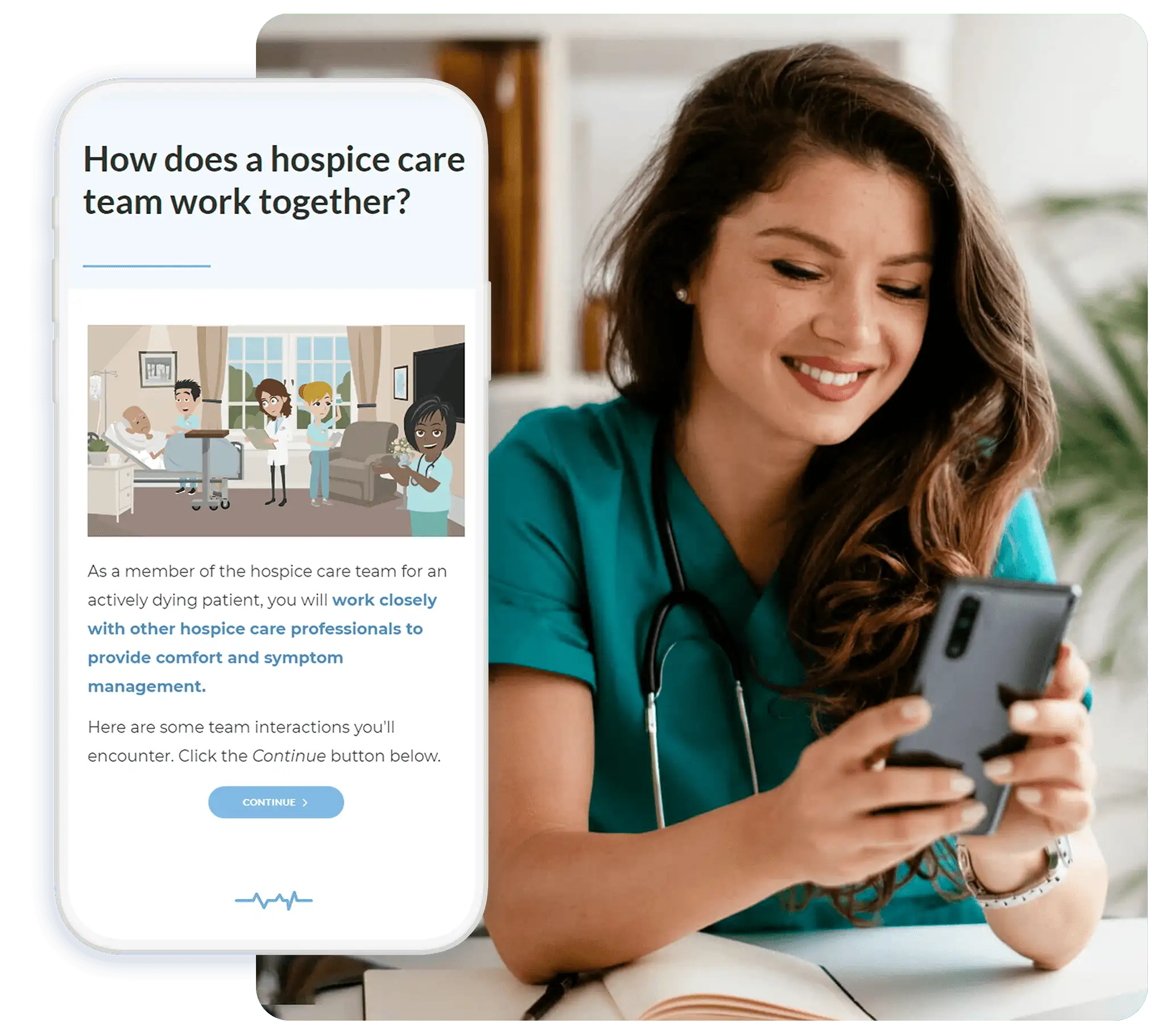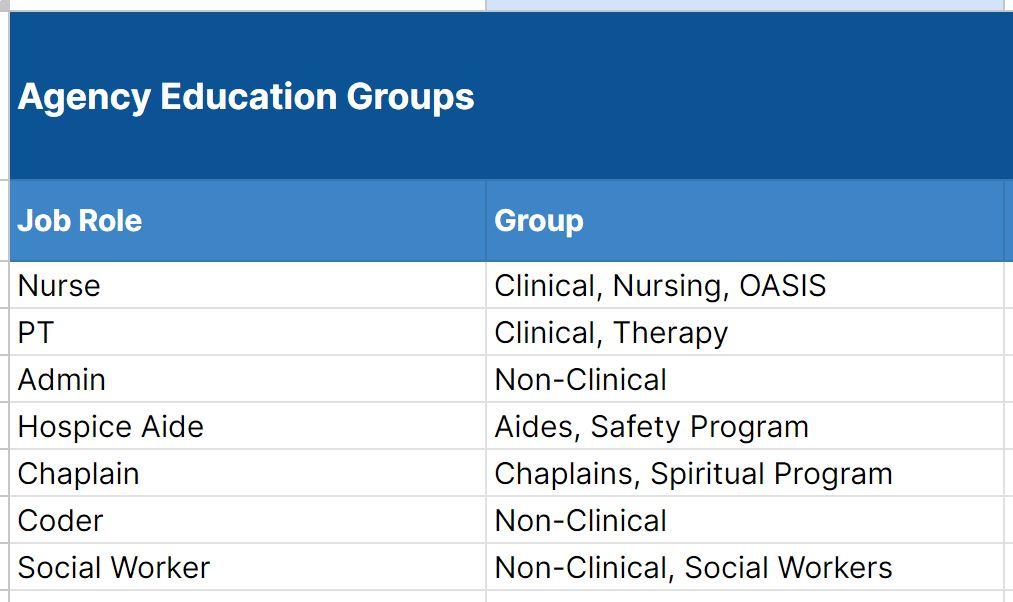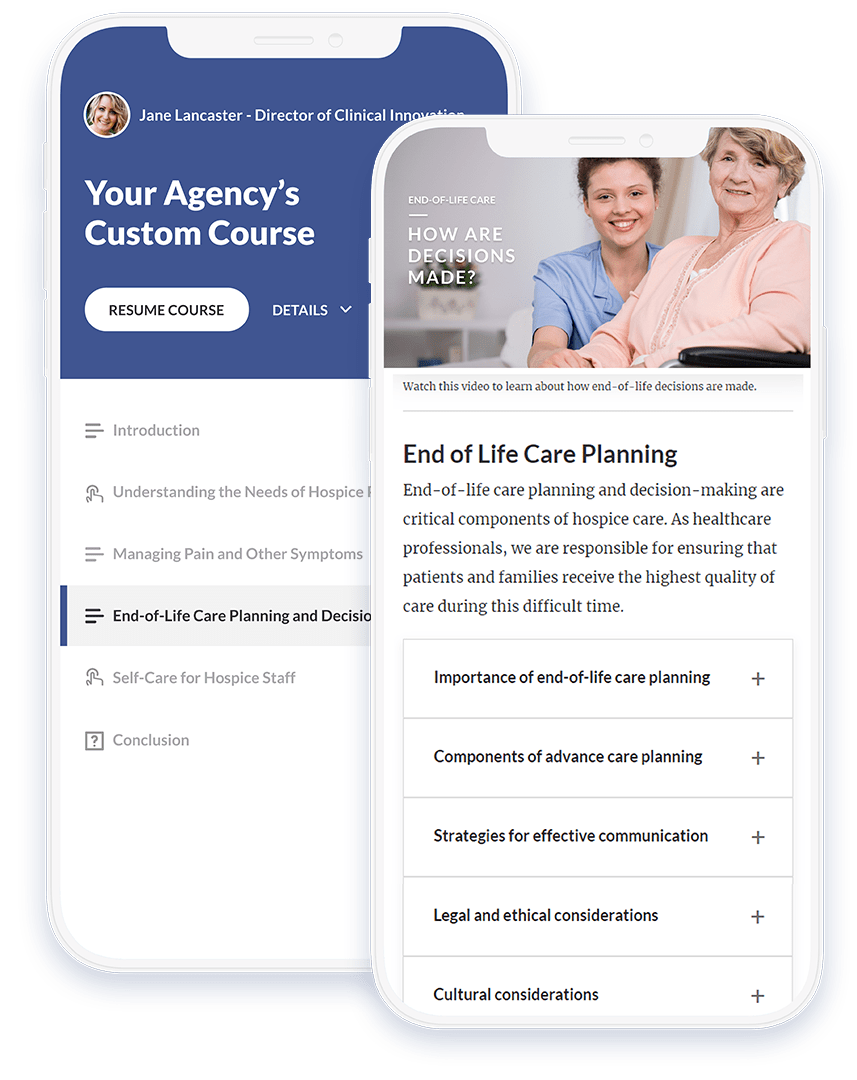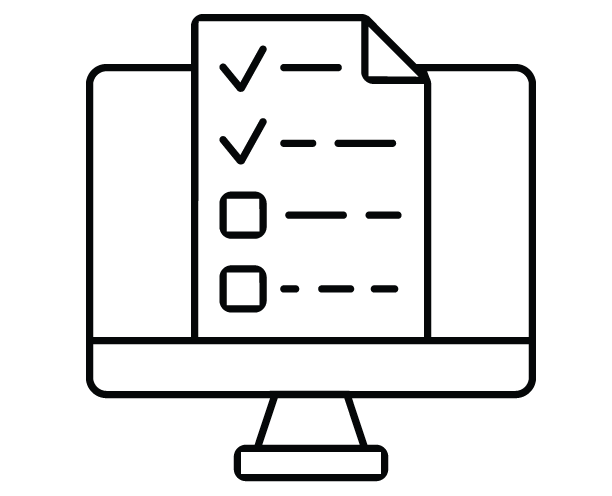Online Hospice Training: A Step-by-Step Guide for Success
If you’re a manager or clinician, understanding the importance of appropriate hospice training in delivering high-quality care to patients is crucial. This guide is designed to assist you in developing a successful online hospice training program that will enable your team to acquire the essential skills for succeeding in this field.
Quick note: If you’re looking for a complete staff training solution for your hospice agency, check out Continua Learning for Hospice.
Key Takeaways:
Online hospice training programs are a key part of of an agency’s hospice software tools, offering flexibility, ensuring proper orientation, and training for success in hospice care.
Use the SMART technique to identify hospice training goals and save time when creating the program.
Group staff based on shared training needs for targeted training, management, and reporting.
When choosing a hospice online training provider, look for a user-friendly and mobile-ready platform, a comprehensive hospice course library, a service that includes instructional designers that create custom courses for you, and custom fields and dynamic rules. Additionally, virtual assistant-level customer service is essential for success.
Develop a launch plan to promote the new solution, ensure clear notifications for enrolled courses, and focus on consistent promotion and engagement for success.
Knowing where to start when creating a training program can be challenging. But with our step-by-step guide, we’ll ensure you have everything you need to get your team up and running quickly.

Why Create an Online Hospice Training Program?
Proper orientation and ongoing training are essential for those working in hospice care. Your agency’s success greatly depends on your staff’s ability to properly manage patient symptoms, communicate effectively with families, and provide emotional support.

CONTINUA LEARNING
Simplify Your Hospice Team’s Training and Skill Building
A complete solution for your agency: more than 125 hospice courses, caregiver in-services, training plans, and more.
However, it’s not practical for your staff to do all their required skill training in the classroom in today’s fast-paced world. With the convenience of online training, your staff can train from anywhere, at any time, without sacrificing that critical time in the field.
Let’s dive in and see what it takes to create a successful online hospice education program.

Step 1 – Identify Your Hospice Education Goals
Every great hospice education for staff program starts with a set of clearly defined goals. We’re big believers in a step-by-step process for building training plans (hence the title of this article!) A great way to accomplish this is by using SMART goal setting. In this context, SMART stands for Specific, Measurable, Achievable, Relevant, and Time-Bound. Here’s what it might look like for an hospice training online program:
- Specific: Meet our annual compliance requirements for staff.
- Measurable: Completion rates among staff should be higher than 95%+.
- Achievable: Provide training accessible for staff from any device, and courses should be a fun educational experience.
- Relevant: Focus on keeping compliant while improving patient communication and pain management skills.
- Time-bound: Achieve 95% staff completion rates by the end of August.
Use the SMART technique for all your training goals, like improving OASIS-E accuracy, not just annual compliance. If you spend time building out your goals upfront, it will save you time down the road when you’re getting into the details of creating the program.

Step 2 – Determine Who Needs to Take the Training
Now that your goals are defined, it’s time to group your staff based on their shared training requirements. At Continua, we do this by creating education groups. Open a new spreadsheet and follow along! Here’s our step-by-step process.
Step 1: List your agency’s job roles in column A. You’ll want to include every role that will require some training.
Step 2: List which education group the role should belong to. Here are some challenges to consider when listing your groups:
- Each job role requires unique training, although some are shared.
- For example, hospice nursing training vs. hospice aide training requirements differ.
- Staff requires annual compliance training; however, they also need skill-building, like addressing gaps in palliative care.
- You’ll need to consider specialized programs, including hospice volunteer training, hospice chaplain requirements, personal care assistant training (PCA training), etc.
Step 3: Complete your education group sheet. To recap, here are the steps listed more simply:
- Create a spreadsheet.
- List your agency’s job roles in column A.
- Add their educational group in column B. Job titles can belong to as many groups as you need to meet your training goals.
Here’s an example of what your education groups might look like:

Taking the time upfront to create your education groups will save you a ton of time once you start your online training. These groups enable you to roll out targeted training quickly. Education groups are a powerful feature that enables easier managing and reporting for your hospice training.
Step 3 – Develop a Hospice Training Plan
You’ve established your training goals, and grouped your staff based on their shared training needs. Now it’s time to decide on the hospice training courses you will assign to those groups. Let’s use the example of annual compliance training for our plan. But how do you know what training each group requires?
We recommend reviewing CMS’s resources, your accrediting body’s requirements, and a few other sites to get a clear picture of your agency’s requirements. Here are some excellent resources to get started:
- CMS’s Hospice Education Resources.
- Healthcare Provider Solutions has a great blog post that outlines hospice training requirements.
- International Association for Hospice & Palliative Care has this very helpful resource.
Build out a list of training each group requires to meet annual compliance, and any skill-building plans from your SMART goals. At Continua, we use spreadsheet templates to create custom hospice training plans for clients. They look like this:

In column A, add the education groups you created in step 2. In column B, list the hospice training courses, like HIPAA Hospice Training, that the group needs to take. You’ll want everything that the group requires to be in compliance.
Finally, add a due date for the training. A due date is important to ensure you stay on track with the training program and hold staff accountable.
Step 4 – Determine How Your Staff Will Train Online
Unless you’re building the technology in-house, you’ll be working with a company providing a hospice course library and learning management system (LMS) to meet your online training goals.
But with so many options for hospice and palliative care online courses, how do you choose a provider? We recommend focusing on five key metrics. Let’s break those down in detail.

User-friendly and mobile-ready
You’ll have a MUCH easier time with online training if your managers and employees find the system easy to use and can access it from any device. Remember, you’re going for high compliance rates. High compliance rates will be challenging if your system is a pain to use.
Hospice course library
Be sure the online hospice training provider’s course library includes the following:
- All of your hospice compliance requirements.
- Hospice education for nurses.
- Hospice volunteer training.
- Hospice aide training.
- Skill-building like OASIS-E and hospice billing training.
- Pca training.
- Regular updates.
Ability to create custom courses
Stock course libraries play a crucial role in hospice training. Still, to create a comprehensive learning experience, it’s essential to incorporate your agency’s unique training content. These likely include:
- Org charts.
- Mission statements.
- Corporate compliance.
- Recorded training webinars from your hospice education team.
- Training that meets your agency’s specific care practices and strategies.
For seamless integration, go with a provider that allows your team of educators to include this content in your programs.
Even better, choose a provider with a team of expert instructional designers who can build your custom courses for you. Custom courses properly created ensure a high-quality output and an excellent user experience for your learners. Here’s an example of the custom courses we build for clients:

Ability to group your users with custom fields and dynamic rules
This sounds intimidating, but let me explain why it’s critical to your success.
Your staff members have unique attributes, such as:
- Job role.
- Department.
- Manager.
- Full time / Part time.
With hospice staff training you need the ability to:
- Put users into the same group based on their shared attributes and then assign that group training (e.g. hospice aide training programs).
- Control who your managers manage.
- Restrict content based on a staff member’s group membership.
- And many more abilities!
All of these features are only possible with custom fields and groups.
Ideally, you want a system that does all of this auto-magically in the background. Look for a provider with dynamic rules features. Check out this example of how we create dynamic rules for our customers:

Notice how we filter by job title, department, and date of hire to create this group. You can add as many or as few conditions as you need to create groups for targeted training and reporting.
When you add staff to the system, dynamic rules automatically add staff to groups based on their unique attributes. Trust me; this will make your training program MUCH easier to manage!

Virtual assistant level customer service
There will be some bumps in the road when starting with online hospice training or switching providers. You’ll need to set up a new platform, train managers and staff, and learn how to report on your training progress.
In short, you’ll have a lot on your plate! It’s best to view choosing a training provider as entering a partnership. And a good partner should provide you with the following services:
- Successful implementation of your new solution.
- Consulting help for your unique training needs.
- Training plan course creation.
- Custom course-building services.
- Phone and email support for your end users.
- CEU reporting.

Step 5 – Implementation and Rollout of Your New Hospice Training Program
You’ve successfully chosen your training provider and completed the implementation process, which includes setting up users, training plans, custom courses, and reporting strategies. It’s time to launch your new solution and establish best practices for managing and tracking the training.
To ensure a successful roll-out, consider the following steps:
- Develop a launch plan: Aim for high initial engagement by creating a clear and effective strategy.
- Communicate with staff: Utilize your usual communication channels, such as email, Slack, or MS Teams, to inform staff that annual compliance training and CEUs can be completed with the new solution. Promote your new solution on all platforms and encourage staff to try it.
- Enroll staff in courses: When enrolling staff for the first time, ensure you’ve set up enrollment notifications from the system. This will help your team receive clear and concise messages, including:
- The course they’ve been enrolled in
- How to access the course
- The due date for course completion
Aim for solution promotion consistency, and you’ll be well on your way to success with hospice training online.
Conclusion
There are many features to look for in a training provider, such as creating ILT courses, forums, gamification, and continuing education opportunities. Still, if you focus on these five, you’ll be well on your way to a successful program.
Our online hospice training solution excels in these categories. Still, we urge you to explore as many training providers as possible to find the solution that best suits your needs.
At Continua Learning, we’re always happy to help agencies better understand what’s possible and the best practices for online hospice training. Reach out if you’d like to discuss this critical topic for your agency.
FAQ
How Long Does It Take To Create An Online Hospice Training Program?
Typically implementing a new program can take 4-8 weeks. However, this depends on your team’s current situation, training requirements, and number of employees.
What Are The Benefits Of An Online Hospice Training Program?
An online hospice training program has many benefits. Here are some great reasons why you should consider an online hospice training program:
- Staff can train from anywhere, at any time, and on their own schedule.
- On a per completion basis, online hospice training is typically more cost-effective than traditional training.
- Access to 100s of courses and CEUs.
- It’s convenient and hassle free to manage training records and compliance from one place.
How Much Does An Online Hospice Training Program Cost?
When it comes to hospice training programs, cost is an important factor. How much does an online program cost? Most solution providers charge a monthly user fee. This fee should include all of the features and benefits, and complete access to course libraries. These fees are typically $2 to $5 per month for each staff member depending on the size of your agency.
Are There Any In-Person Components To An Online Hospice Training Program?
It’s a logical question to ask: are there any in-person components when it comes to an online hospice training program? Answered simply, yes! A good solution should offer the ability to create, manage and track ILTs (instructor led training) and combine those with eLearning courses for a truly blended learning experience.

